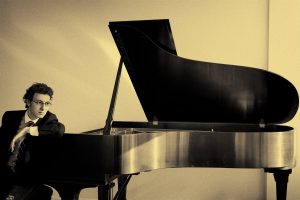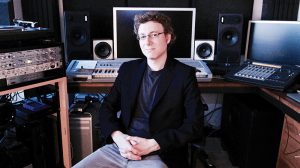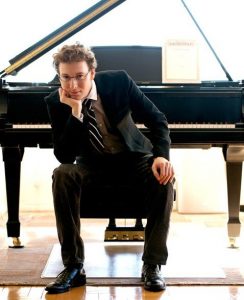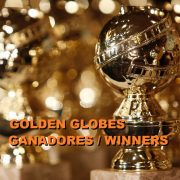Nicholas Britell – Interview
A few weeks ago, and during the World Soundtrack Awards 2018 celebrated in Ghent (Belgium), Gorka Oteiza had the opportunity to interview composer Nicholas Britell for SoundTrackFest.
Here you have the full interview, where they talked about how he decided he wanted to score movies, how he created the musical world for the Oscar-winning movie Moonlight (and the funny moment that happened at the ceremony), his first TV series: Succession, or the Hip-Hop band he had in college, among many other things.
INTERVIEW
Nicholas, thank you for being here for SoundTrackFest. We love interviewing composers. That way we can ask you what’s behind the music we enjoy so much, or what you wanted to achieve when you create the scores for the movies…
Well… or at least you can ask us what we try to do… (*laughs*)
Well, sometimes that’s true (*laughs*). This way we can know what your intention was, the direction you followed, and the meaning of the music you were composing. So it’s important to have your voice and your feedback in SoundTrackFest.
Absolutely. And thank you for having me!
The first question is quite compulsory, but here it comes… Did you always know you wanted to be a movie composer? Or is there a moment in your life that you suddenly realized and said, “Oh! I love music, but music for movies? That’s really interesting. I want to do that.” Did something like that happen to you? Is there a moment you remember having that vision?
That’s a good question. When I first started playing music it was actually because of film music. When I was five years old I saw Chariots of Fire, and I loved the music, it was amazing. We had a little upright piano in our apartment in New York, and I went to the piano and tried to figure out how to play that piece. I asked my mom for piano lessons, so in some ways, it was actually film music that inspired me into music.
Then I became a classical pianist and always loved music and performed. I wrote music when I was growing up, but I never knew how, or if it was even possible as a way of life. It was in college where a very dear friend of mine, Nick Louvel, was making his own first feature film, Domino One, and he asked me if I’d write and play the music for the film. That film was never formally released, but it became a project that we worked together on for about three years. And that was my first sort of experience with how wonderful it is to work in film music, and to get the chance to collaborate with people, to try things and experiment.
It was nice to be part of a big project like that…
Indeed. And seeing it up close, and being involved. Especially because it was with my friend, and seeing all the work that went into it and understanding all the different parts. I just loved it, I thought it was so wonderful. I was still playing in a band that I had in college; I was actually performing with it, and I was giving some concerts, but I realized that this was such a great experience and I wanted to do more of this.
I had another friend who asked me to do a documentary he was making, and I wrote the music for that. So I just started to learn by doing it, by working with friends, by trying things out. I think that until you’re doing it, somehow, you don’t know if it’s possible. Even now I feel very lucky to have the chance to do it, so it’s a constant journey.
You’re having a very successful career, you are still not 40 years old and you’ve made many well-known films…
Well, it’s my birthday today actually…
Is it? Oh! Congratulations. 38 years if I’m not mistaken! That’s why I scheduled the interview today, as a birthday present to you (*laughs*)
Right, right! (*laughs*)
Let’s keep talking about movies and the many, many people that collaborate to make the final result. The creative process of scoring a movie is something that can be very long or very short. You can start at the very beginning or be on board right at the end, in the last few weeks. When do you prefer to start collaborating on a project? How is your creative process?
I think it depends. I think there are some projects, where just because of the nature of the project and the timeline, that you get involved after the movie is all done, so you just get a quick window where the music needs to be done. And sometimes that can be great, there are positives there. When you’re limited in your time you don’t second guess yourself. There’s a good Leonard Bernstein quote… I think the quote is something like, “To achieve great things, two things are needed; a good idea and not enough time.”
That’s a great quote!
Indeed. That’s the positive scenario, where you’re limited in your time. But I’ve also had the opportunity of working over long periods of time, getting a script before a movie is shot and really exploring things. That can be amazing in its own way, where you have time to live with the ideas, and you have time to see the project evolve. You can experiment. So I think that’s the sort of thing where it can be very wonderful to see ideas evolve.
I think my preference generally is to have more time, but it really does depend. It’s not always your choice. There are amazing projects that come along and just because of the nature of where they are in their production cycle, you get involved later. Schedules, you know, there’re a million things that can happen…
Once a Spanish composer told me “You have to realize when you see the credits of the film, that we, composers, are at the very end. We are in the post-production section.” So, some people treat music as post-production but they shouldn’t, it should be part of the creative process because it can alter the story completely.
Absolutely and it is. Maybe I’ve been very lucky, but the people I’ve worked with, view the music as very important. For example, I worked very closely with Barry Jenkins while they were editing the movie. And with Adam McKay, I have actually set up a studio in the edit facility with Hank Corbin, the editor. Then Adam, Hank and me, sit there and try to figure out how to make music work for the movie.
Many of the people that I have worked with really do care about that process, and it’s wonderful, and you really become integrated with the team that way. And you’re right, music can completely shift your perception of the emotions of a project, and the only way we’ll know what that is, or what the right way to do it, is to be there and to be trying things out. Cause there’s no obvious right answer, it’s just feelings and choices, and seeing how different scenes respond to music, or deciding if you even want music in that particular area. These are all sorts of things that are like… “What’s the right approach?”… In fact, there’s no right answer…
There’s no manual that tells you how to do that…
No manual. And it’s not a science. It’s really not a science. There’s no formula for this or that, which is why I think it’s interesting. You just try things out.
Well, but there is one movie that you tried and you did very well… as its score got an Academy Award nomination: Moonlight. The music was nominated, and also the movie was nominated, and won many awards, not only at the Oscars. By the way, it was a funny moment at the Oscars, wasn’t it?
It was crazy.
You were there on stage?
I was there on stage, yeah.
You were sharing the stage with the guys from La La Land.
Well, we were there and it was a very confusing night. We were applauding for La La Land, and well… we know those people so well and they’re a wonderful team… and suddenly there was a commotion, and someone said, “Oh you won.” And I was like, “What are you talking about?” And I was thinking… “No…”… And then the next thing they’re like, “No, no, you have to go up” and so I went up there and we were all coming up on stage and we were just very confused. Honestly, we were shocked and we didn’t really understand what was happening, so I don’t think we really got the chance to appreciate everything until later.
That’s true, when those things happen so unexpectedly and you’re in that strange situation, you don’t get time to taste that nice feeling.
You don’t really know what happened. And we were there and I think there are some pictures of me looking very confused. (*laughs*)
(*laughs*) I’m sure of that! And… I suppose that the after party of the Oscars had to be very interesting that year.
It was very interesting. (*laughs*) Look, it was incredible because we did win Best Picture which was unbelievable, but it happened. It was definitely an after party where we all were sort of like, “What just happened?” (*laughs*)
Ok, let’s get back to the movie after that curiosity (*smiles*), and tell us, how did you get to the project and what was the approach you gave to the music? What conversations did you have with Barry Jenkins for “Moonlight”?
I scored ‘The Big Short’ with Adam McKay. I was writing the score for that in 2015, in the summer. One of our producers on The Big Short, Jeremy Kleiner, told me about this incredibly beautiful script he had read, and asked me if I’d like to read it. The script was called Moonlight. And I read it and I thought it was amazing, and I asked if Barry might be interested in meeting with me, as I would just love to talk to him. So we met up and we had an amazing conversation where, for many hours, we had a few glasses of wine and talked about everything, about ideas, and we started a conversation about what the music might be for the movie.
I was immediately struck from the very beginning of how open to exploration Barry was, as far as thinking about ideas, and thinking about possibilities. He was so excited to try new things, and that was how it started. Early on, he told me that he was imagining a more orchestral kind of sound for the movie, and I thought that sounded very exciting. But of course the movie hadn’t been shot yet, so we didn’t really know if it was the right tone. And then we also talked about this idea that we were having of… I think I might have told you before… but Barry loves chopped and screwed music. Which is this style of southern hip-hop, where you slow it down and when you slow it down, the pitch goes down and you get this very rich texture. So we talked about this idea of, “what if I wrote music, and recorded my music and then I used that technique on my own music?” And Barry was just as excited as I was about this possibility. We didn’t know if it was going to work, we tried it out early on when they started editing the movie, and it felt really interesting and Barry felt it worked.
So I started writing pieces and I sent in stuff, and we’d try experimenting this technique in certain ways. It became part of the way that I would evolve some of the ideas in the movie; using this technique and see how that would change the sound. So that was really the start of it, but it was definitely this conversation with Barry the trigger of all that came after.
That’s interesting because Barry Jenkins is an open director. He didn’t have an exact idea of what he wanted, but the conversation between the two of you just arrived to a point where you both felt that found what the story needed. That’s the interesting part we were talking about the creative process earlier.
Exactly! Yeah, absolutely. You always have to try things and be open with new ideas, and I think that’s what’s interesting about it. What’s exciting is trying new things and seeing where they take you, and working with directors who are open. That’s when it’s fun because then, every project is different. Every project is its own sort of adventure, where you enjoy it and you challenge yourself.
Talking about new projects and different styles, you did a television series recently, Succession, 10 episodes, and that was your first TV show.
It was!
How do you feel about changing from movies to TV? Do you find a very big difference working for TV than for movies?
It’s different because there’s a lot more length and work. (*laughs*)
Okay, so it’s like doing 10 movies. (*laughs*)
Yeah, it really is. I would say it’s like 5 movies. It’s that kind of thing, because you basically have so much more material to work with. And the story arcs are longer. There’s much more that happens, or can happen, in 10 hours.
Adam McKay was one of the producers of the series, and I worked closely with Jesse Armstrong, the creator and showrunner, and I still used the same approach, where I met with Jesse and Adam, and talked about the music and showed them things I was thinking of, from very early on actually. I worked on the pilot for Succession in… 2016 I think? I mean, it was a while ago, it goes way back.
And then we had time, they worked on the pilot, then the show was approved, and went forward, then they wrote the episodes, they shot the episodes. Actually, I was working on it and thinking about it for a really long time, which was great in a way because we were able to, similarly, see the ideas involved and try things out.
It was on a moment-to-moment basis, it wasn’t that different from doing a film, but I think it’s the scope that’s different and the approach is a little different too. I would write a lot of music and then I’d receive the episode and have to decide which music to use.
So a part of the goal is figuring it out. In a way, Moonlight has just a structural comparison to Succession, because, in Moonlight, there’re three chapters and you’re trying to figure out a way that you can connect the three chapters, but also change and evolve. There’s an identity to it.
But in a similar way, whenever you have structures like that with episodes, there are some similarities too. Where you want to connect the episodes, you want things to feel like they’re the same show, but you also want to change things. One of the fun things is there were these certain themes, main title theme that I wrote, which is this sort of crazy, classical music with a huge hip-hop beat. It’s sort of dark, serious, but absurd feeling. And that kind of a theme became a theme I utilized throughout the series, and then I would write different themes for some of the different characters and for some of the different feelings that we wanted to imply.
Like there’s a certain theme for the patriarch of the family, there’re certain themes for when they’re in their apartment, there’re certain themes for certain feelings, like when Kendall, the son who’s trying to be the CEO is in pain. There are different kinds of motifs.
So you had different characters, situations, and feelings that really need to be pointed out and you did it through your music.
Exactly. And then we want to figure out if there are places in later episodes where we can recall a feeling, and show how it’s connected. For example, I’d record music, classical music I’d write, and then I’d actually sample my own recording and put a beat to it. So I would almost create hip-hop tracks out of my own recordings, which was pretty fun.
That’s interesting because I have read about your hip-hop past, and that you had a band. It’s funny how being classically trained and having the piano as your main instrument… you get into that kind of project. Maybe it’s like “This is something different and I also want to try this” situation? How did you get there?
I love just exploring different styles of music, I always did classical and then I did jazz. I was a cocktail pianist in high school and I would play in hotels and bars and places like that. And then in college, I had this hip-hop band with friends of mine; it was two rappers and six live musicians. I just love different styles of music. I think a lot of this is about doing stuff you’re interested in, and playing live hip-hop music, was an amazing experience. And performing, we opened for Jurassic 5, the group in Blackalicious. Playing big shows was really exciting and it gave me a different perspective on musical life, on what that might look like.
That’s very interesting because you are very open-minded, and having all those skills to use them in the movies, gives you a broad range of options.
Well, I try to!
So let’s finish with one last question. You’re a young composer, but you already have a successful career, and you’re getting bigger and bigger. But here in this festival and other festivals, there are a lot of young composers looking to start their careers and trying to get noticed. So, what advice would you give them from your experience? What should they do or what shouldn’t they do? Maybe you have any advice on something not to do? Like “don’t make this mistake I made”…
Yeah, that’s a good question! I think that, for me, some of the things I found very helpful in the end, are the more obvious things: you have to love writing music and you have to know how to write music. You have to spend a lot of time exploring your art, exploring yourself. For film music, you also have to love movies, and you have to really know a lot about movies. You have to watch movies, you have to study movies, you have to study how music works; you have to know all the different ways that music has to work on a movie.
Maybe you also have to get in the head of the director?
You really do! And you have to be aware that different directors use music differently, and different composers write different scores. And you have to understand all those possibilities, because when you’re bringing your voice and your advice to a director, you’re saying, “here is what I think we should do”. I think you need to have a lot of knowledge of what the history is and what is possible, because that’s one of the ways you can provide a perspective; knowing different ways that something can happen.
But at the practical level, the stuff that is really helpful is going to film festivals. I think the key is: if you love movies and you already know how to write music, meeting directors and producers is the most important thing you can do. So I would say you’ve got to go to film festivals. You should go to film festivals. If there is a university in the place you live, try to collaborate and work on anything. I scored so many short films and it was fun. There were many years that went by where I didn’t even know if anything would happen with any of these. But it was just about getting the opportunity to do it. That was really fun and really exciting.
So I think for me, that’s really the key. You want to have these opportunities, but you have to do it because you really love it. It’s a long period of time that it takes to develop those relationships, and like I was saying before, from the time I first started working with my friend Nick, with that film in college, until now, is 17 years, that I’ve been thinking about it and trying. Also, I’ve been playing music for 33 years, so… you know what I mean? I was playing since I was five, so it takes a long time basically, but if you like it, you don’t notice the time. It just happens and you just have fun with it.
That’s good advice for new composers; watch out and attend festivals and really love it and go for it.
Exactly, yeah!
Nicholas, that’s fantastic, thank you very much for your time and for your insight information!
Thanks to you for sharing this with your readers. It was good talking to you Gorka!
Interview by Gorka Oteiza














